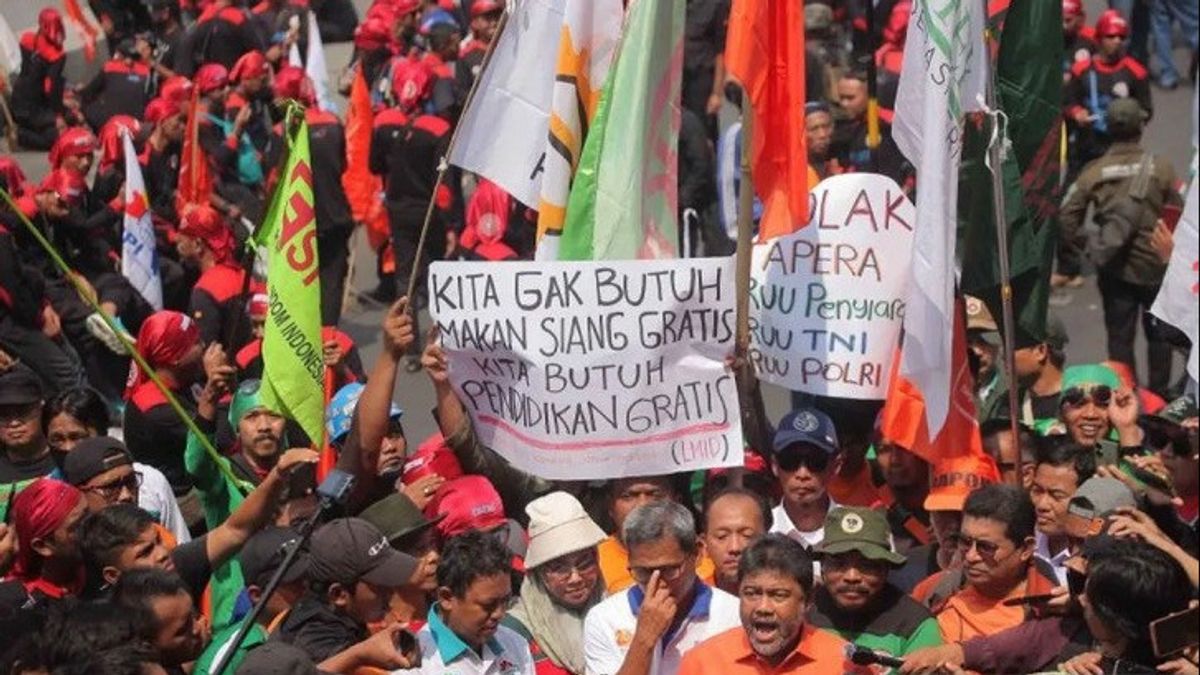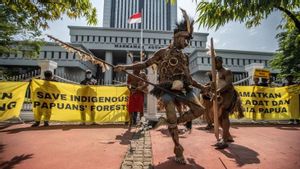JAKARTA The implementation of the People's Housing Savings or Tapera contribution is believed to only benefit the government. Meanwhile, for the community, purchasing power can decrease and unemployment rates have the potential to increase, according to a simulation conducted by the Center of Economic and Law Studies (Celios).
Since President Joko Widodo signed Government Regulation (PP) Number 21 of 2024 concerning Amendments to Government Regulation Number 25 of 2020 concerning the Implementation of Tapera, a wave of rejections has occurred everywhere.
Starting from workers, to employers compactly reject the program for housing financing. In the aftermath, thousands of workers held a demonstration at the State Palace, Jakarta, Thursday (6/6/2024) to reject the Tapera policy.
The rejection of workers and employers is not without reason. Until now, workers have been subject to various mandatory deductions such as Income Tax, BPJS Health, BPJS Employment, and Old Age Security (JHT). The increase in contribution obligations through the Tapera program where workers have to pay 2.5 percent of the salary and employers pay 0.5 percent of the salary, it is believed that it will further erode people's purchasing power.
Not only that, concerns about the birth of new corruption lands have also surfaced. The reason is, the management of social security funds has been quite frequent by government-owned companies that have lost up to tens of trillions.
In the midst of economic downturn and people's purchasing power, of course these pieces are very burdensome. Naturally, there is a rejection from the business world to online driverojek associations.
Director of Economics Celios Nailul Huda said, based on the results of economic simulations, the Tapera policy caused a decrease in gross domestic product (GDP) of IDR 1.21 trillion, which had a negative impact on the overall national economic output.
"The calculation of using the Input-Output model also shows that the surplus of profits from the business world has also decreased by IDR 1.03 trillion and workers' income has been affected, with a contraction of IDR 200 billion, which means that people's purchasing power has also decreased and reduced demand for various types of business sectors", said Huda in a statement received by VOI.
SEE ALSO:
Meanwhile, Executive Director of Celios Bhima Yudhistira said the most significant effect of implementing the Tapera program was the reduction of labor. According to Bhima, when Tapera is implemented, it can trigger the loss of 466.83 thousand jobs. This happens because of the reduction in consumption and investment by the company if Tapera's mandatory contributions are implemented. Indeed, there will be a slight increase in state revenue, but it is not comparable to the loss.
"Although there is a slight increase in net state revenue of IDR 20 billion, this amount is very small compared to the economic losses that occurred in other sectors", added Bhima.
The rejection of the Tapera program is not solely because workers and workers object to the addition of this obligation. The public already does not believe in the government's social security fund management scheme.
Our community still remembers the Jiwasraya and Asabri cases, whose investment losses reached up to tens of trillions.
In 2019, Jiwasraya suffered a policy failure to pay his customers for investing participant funds into risky financial instruments. At that time, the Attorney General's Office calculated the value of state losses reached Rp. 13.7 trillion.
A year later, the Attorney General's Office revealed almost the same problem with Asabri. This state-owned company suffered losses of up to IDR 10 trillion due to investment management in the form of shares that experienced a decline in value.
Finally, the Corruption Eradication Commission (KPK) is also investigating allegations of fictitious investment corruption in Taspen. The KPK said that PT Taspen invested up to Rp1 trillion in funds, and some of that were allegedly fictitious.
The series of cases made the public doubt the idea of financing houses for employees with the Tapera scheme. Social security observer Timboel Siregar mentioned several things that caused state-owned companies to be incompetent in managing public funds.
First, because there are no strict rules regarding investment. Limited companies in the form of Companies such as Jiwasraya, Asabri, and Taspen have the orientation of profit or pursuit of maximum profit.
That is why these companies are allowed to invest customer funds into a number of financial instruments, ranging from state debt securities, deposits, mutual funds, or stocks. The problem is, there are no strict rules regarding what investment products are allowed.
"If the shares, for example, have to be in the LQ45 category or have high liquidity, it doesn't exist," said Timboel.
"So you want to buy any shares. It's different from BPJS Employment which is prohibited from buying fried shares," he added.
This practice is evident from the Jiwasraya case which places 22.4 percent of financial assets into shares, which are mostly performing poorly. Likewise with Asabri. At least 13 stocks were purchased but gave negative returns.
Another problem is the weak supervision of independent institutions such as the Financial Services Authority (OJK). So far, OJK has only focused on the non-bank financial industry. Whereas they should also oversee stock investments made by state-owned companies.
Jangan malah seperti yang terjadi pada Taspen, di mana OJK baru bertindak ketika sudah kejadian. Bagi Timboel tindakan seperti ini bukan bentuk pengawasan.
"If the supervision should be proactive in looking for it so that it can prevent it. This is like working downstream. The incident then took action," he said.
"OJK should spy before the funds are invested. For example, Taspen wants to buy A's shares, OJK visits, and his studies are being sought. So people's money is safe," Timboel said.
The English, Chinese, Japanese, Arabic, and French versions are automatically generated by the AI. So there may still be inaccuracies in translating, please always see Indonesian as our main language. (system supported by DigitalSiber.id)














